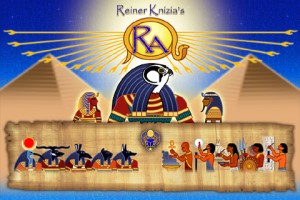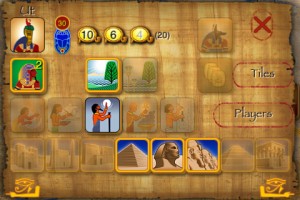Review: Ra (iPhone)
Posted by James (admin) on November 16th, 2010
 THE GAME
THE GAME
Ra is one of Reiner Knizia’s classic games. In this case, it’s an Egyptian themed auction game. Players take turns either adding a random tile to those to be auctioned, or they can start an auction for the already drawn tiles. If a Ra tile is drawn an auction is automatically initiated. Three times during the game, the players score points (depending upon the type of tiles) for the tiles they have won, but the heart of the game is the clever, yet simple, bidding system.
During an auction, players get one opportunity each (going clockwise) to outbid any previous bid using one of their sun stones which each have unique values between 1 to 16. Players start the game with a pre-defined group of 3 sun stones (4 in a 2-player game) ensuring each player has a fair mixture, plus 1 sun stone is placed in the centre of the table.
The highest bidder wins all the tiles currently on offer, plus they take the sun stone from the centre and replace it with the sun stone they used to win the auction. The newly gained sun stone can not be used for the rest of the current epoch but will be used by the player during the next epoch. Some tiles are disasters which require the player to discard tiles.
The game is split into 3 epochs – an epoch ends when all players have used all of their sun stones, or when enough Ra tiles are drawn, and each player scores the tiles they currently own. Different types of tiles score differently; for example, Nile tiles are worth 1 victory point (VP) each but only with a flood card; the player with the most pharaoh tiles scores 5 VPs (-2 VPs for the player with the fewest), and so on. Players must discard many types of tiles after each epoch. Monument tiles (which do not get discarded) only score at the end of the game based on the amount of different types owned and for having sets of the same building.
 OPINION: GAMEPLAY
OPINION: GAMEPLAY
The bidding system and the tile scoring are the two mechanics that combine to deliver engrossing gameplay. The closed sun stone bidding system is very involving because you have to consider what sun stone you will receive if you win the bid in addition to the what tiles you will win. Replacing a high value sun stone with a low value stone may negate the gain of winning the tiles on offer. Conversely, it can be worth winning zero tiles just to swap a low value sun stone with a high one so you have better stones for the next epoch. Players score points for the highest total value of sun stones after the 3rd epoch too so gathering good stones remains relevant in the final round.
The different ways tiles score adds great variety and further depth to the auctioning decisions. Lots of factors need to be weighed up during an auction, such as what tiles are on offer, where in the bidding order you are, what sun stones other players have, what sun stones you have, how many tiles are on offer, how far through the epoch you are, etc. This gives lots to think about and assess.
Another exciting factor is that players can choose to cause an auction on their turn so you have some control over what you or others can win. This can alter the allure of different auctions to opponents. If you know a player really wants one specific tile type you can force an auction that will tempt them to win it but gain little else. Howe er, if you initiate an auction you must bid for it if no-one else does, so that adds another factor to weigh up.
The scoring system can be a bit fiddly and hard to assess during the game but it’s simple and is easy to remember after a game or two. Downtime is very low because turns are taken quickly and you’re always monitoring the ever changing situation. The only time you’ll endure any period of downtime is self-inflicted if you win 3 bids early during an epoch meaning you no longer take part in it.
With all these factors, Ra delivers a very compelling game with variety in its replay.
 OPINION: IMPLEMENTATION
OPINION: IMPLEMENTATION
Implementation is always critical to any game on such a small screen. In Ra, there is a lot of information to display at once but, similar to their other iPhone game (Medici), the developers have designed an interface which effectively handles a difficult challenge. The actions of drawing a tile, starting an auction and selecting a sun stone for bidding are easy to do. The buttons to accept/cancel are okay but quite small – these appear next to each player’s icon but I think it may have been better to have moved the player icons closer and have a larger dedicated area for the accept/cancel buttons as players never need to access these simultaneously.
As well as the main game screen, there are screens showing each player’s current tiles, a screen showing all players current tiles, and a screen showing what tiles remain to be drawn. So, all the information is there if you need it and usually easy to access direct. Players new to Ra may take a while adapting to the scoring system because of its variety but one ting I really love is that you can tap on any of the tiles and instantly see help information on how they are scored.
When playing solo, there are several AI styles to play against (in any combination). The AI takes its turn quickly which is very useful when playing a 5-player game. When I’ve used all my sun stones during an epoch I would have liked to be able to fast forward the game. There are quite a few animations but you can turn off most of them to speed up the game. Most games last around 10-15 minutes and you can resume a game if you switched to another app.
The AI have ELO ratings (a system that allows players to gain and lose points depending upon how difficult or easy a match was) so you can climb (or descend) the solo play ladder. Plus, this system means you can easily see which AI characters you find the most challenging. So far, I haven’t really felt a big difference in the playing style between the different AI types but I’ll wait to play it more before having a full assessment of that aspect. So far, I’ve won a few games but lost many too so I like that it’s not too easy.
Ra can be played ‘hotseat’ (one iPhone passed between multiple humans in the same room) but there’s no online mode. I usually don’t think is usually too much of a problem but Ra is all about player decisions, so online play would actually add more value than in most iPhone board games just because different people think so differently.
Overall, Ra on iPhone is a very well-executed version of an already compelling game. It’s great to be able to play Ra in this portable format which is also very good value.
James.
Want to purchase Ra for iPhone?
Use a link below to go to the App Store and 4% of your purchase will go towards maintaining this site (at no extra cost to you).
 |
For iPhone (reviewed) |
 |
For iPad |

